Family Thanksgiving Goes Downhill After Their Inconsiderate Cousins Bring Their New Pup To The Rental Property Without Permission
Turkeys were carved, pies were served, and thanks were given — the next holidays are right around the corner, but Thanksgiving this year was memorable for many people. It's the first post-Covid Thanksgiving since 2020, where everyone feels safe enough to gather in a large group.
A large group means an environment ripe for drama. This family did not disappoint on that account after what happened at their celebration this year.
OP posted on Reddit on behalf of her family. They are all wondering if they behaved dramatically and were "anti-dog" when they turned their cousins away because they brought a puppy.
In OP's family, Thanksgivings are always an extended family event to which everyone is invited. They rent a large house to accommodate their large group annually.
They rent this particular house every year and have since cultivated a great relationship with the property manager. They observe the rules religiously, one of which is that no pets are allowed inside the rental.
If one of them were to bring a pet, they would have to let the manager know ahead of time and pay an additional fee. This has never been a problem because none of them has brought a pet to the event over the years.
Except this year when their cousins brought their new pup without letting anyone know beforehand

Here's the short version for those in a bit of a hurry:

They told their cousins they can't let the puppy go inside the rental.
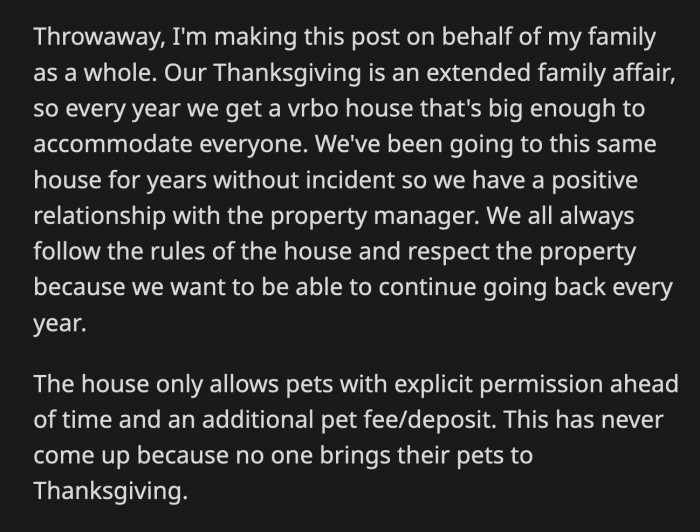
The Dynamics of Family Gatherings
Dr. Abigail Foster, a family psychologist at Duke University, explains that family gatherings often bring to light underlying tensions and dynamics.
Her research indicates that when individuals disregard established boundaries, it can lead to feelings of resentment and conflict among family members.
In this case, the decision to bring a pet without permission disrupted the established order, highlighting the importance of respecting family agreements.
Navigating Family Dynamics
Family gatherings often bring together diverse personalities and dynamics, which can lead to misunderstandings.
Research from the University of California shows that expectations during holidays can heighten tensions, especially when boundaries are crossed.
This situation illustrates the importance of clear communication about family rules and expectations.
They had a carrier with them, so the first solution was to keep the puppy inside the carrier and leave it on the porch since the temperature was safe for it.
OP's other cousin even offered to take the puppy to her house nearby, but the dog owners refused both offers, which was odd since they had no problem leaving the puppy when they went on a week-long vacation.
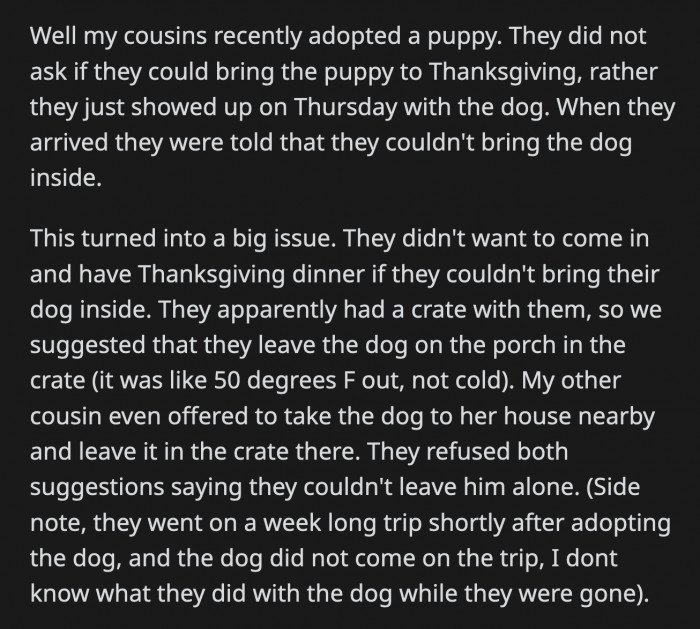
They could have stayed for 20 minutes to eat with the rest of them, but they said it wasn't worth it, so they left. Were all of them wrong for turning their cousins and the puppy away?

OP and the rest of the family didn't set the rules; they were following the rules set by the property owners, as they have done for years without a hitch. Side note: VRBO stands for vacation rental by owners.

Conflict during family gatherings can also stem from differing expectations. According to studies in family systems theory, miscommunication about rules and boundaries often leads to misunderstandings.
Establishing clear guidelines prior to gatherings can help ensure that all family members are on the same page, potentially reducing conflict and promoting harmony.
The decision to bring a new puppy into a family gathering without permission can reflect deeper issues of respect and responsibility.
Studies in family psychology highlight that boundary violations can lead to feelings of resentment and frustration among family members.
Addressing these boundaries directly is crucial for maintaining harmony within the family unit.
They should have asked if it was okay before showing up at the rental.
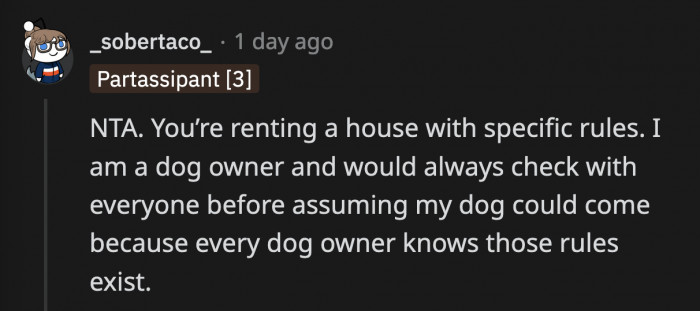
Yes, the cousins are entitled, but it is not uncommon for some families to include pets at their events. However, explicit permission from the homeowner or host is needed before doing so.
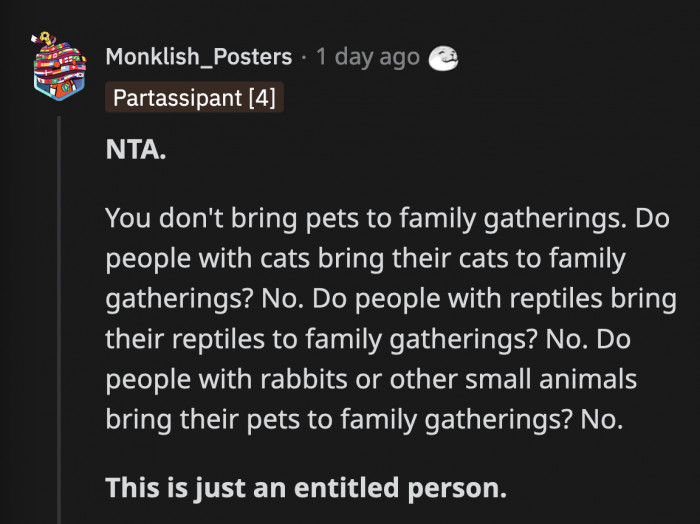
You should ask well in advance, and if the host says no, you have to deal with that as a pet owner. You are just a guest in their home, after all.
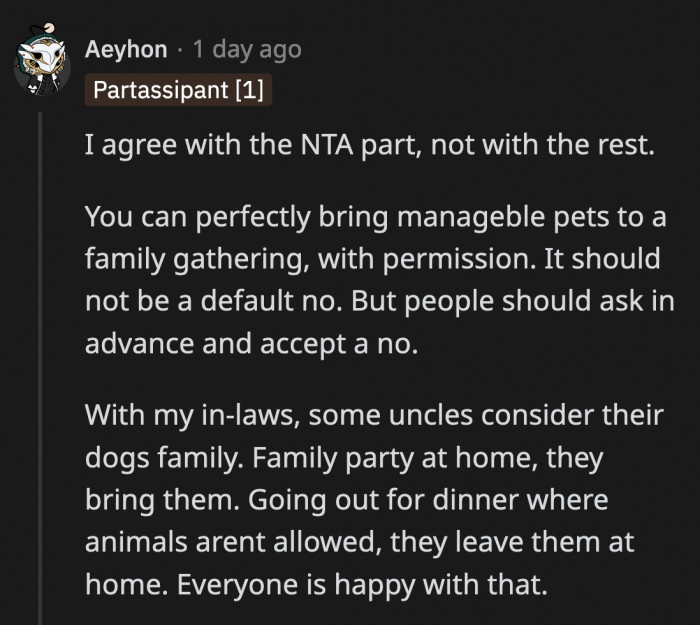
The Importance of Boundaries in Family Dynamics
Understanding and maintaining boundaries is crucial in family relationships. Research shows that families with clear boundaries often experience healthier dynamics and less conflict.
In this case, the lack of communication regarding pet policies indicates a need for families to have candid discussions about their expectations.
Encouraging family members to voice their concerns can lead to a more supportive environment.
Understanding Emotional Responses
When family members disregard established rules, it can trigger emotional responses ranging from anger to disappointment.
Research shows that these reactions are often rooted in feelings of being undervalued or disrespected.
Recognizing these emotional triggers can facilitate healthier communication and conflict resolution.
OP and their family will lose the trust of the property manager after cultivating the relationship for years had they allowed the puppy inside the rental.

How come they didn't know the no-puppy rule when everyone else did after renting the property year after year?

Even if Thanksgiving was hosted in one of their homes, the cousins should still ask if they can bring their dog.

Moreover, emotional dynamics can complicate interactions during family events. Studies in emotional intelligence suggest that recognizing and managing emotions can improve communication and promote understanding.
By approaching conflicts with empathy and openness, family members can foster a more collaborative atmosphere, reducing potential hostility.
This approach can help strengthen family bonds, even in the face of disagreements.
Moreover, this situation underscores the importance of empathy in family interactions.
Studies from the Journal of Family Psychology suggest that practicing empathy can help family members navigate conflicts more effectively and strengthen relationships.
Encouraging understanding and compassion can help mitigate tensions during family gatherings.
Or, as the comment above said, someone present could have a dog allergy, and bringing a puppy without notice could jeopardize their health.

It's not like OP's cousins were not offered other options. They were, but they were set on having the puppy with them throughout the dinner.

When they didn't get what they wanted, they left in a huff, and somehow OP & the rest of the family were the entitled ones? They just followed the rules set by the property manager, which their cousins didn't think applied to them.
There are some places where you can't take your pets, and you can't throw a tantrum to get your way. If OP's cousins see themselves as committed dog owners, they have to accept this now before we read about them again on social media.
Setting Boundaries for Healthy Interactions
Establishing clear boundaries is essential for fostering healthy family dynamics.
Research indicates that families who communicate their needs and expectations tend to experience fewer conflicts.
Creating a shared understanding of family rules can promote mutual respect and cooperation.
Additionally, involving all family members in discussions about boundaries can encourage buy-in and accountability.
According to studies in social psychology, collective decision-making can enhance commitment to family norms and reduce the likelihood of future conflicts.
Encouraging participation fosters a sense of belonging and shared responsibility.
Strengthening Family Bonds
Family gatherings offer opportunities for connection and bonding, but they can also highlight areas for growth.
Research from the Journal of Marriage and Family indicates that families who engage in regular communication about their dynamics tend to have stronger relationships.
Fostering open dialogue can help family members understand each other's perspectives and build stronger connections.
Ultimately, creating a culture of respect, empathy, and understanding within families is essential for navigating challenges.
Studies emphasize that families who prioritize emotional awareness and support tend to report higher levels of satisfaction and cohesion.
Encouraging open discussions about feelings and expectations can lead to more harmonious family interactions.
Psychological Analysis
This situation illustrates the challenges families face when navigating differing expectations and boundaries. Clear communication about family rules is essential for maintaining harmony and understanding during gatherings.
Analysis generated by AI
Analysis & Alternative Approaches
Family dynamics can be complex, especially during gatherings where expectations clash.
Research underscores the importance of setting clear boundaries and fostering open communication to navigate conflicts effectively.
Ultimately, creating a supportive and understanding family environment can enhance relationships and satisfaction.
Practical Strategies for Family Communication
Effective communication strategies can enhance family interactions during gatherings. Psychologists advocate for using active listening techniques to ensure all voices are heard.
Encouraging family members to express their feelings without judgment can foster a safe environment for dialogue.
Implementing these strategies can help navigate difficult conversations and facilitate a more cohesive family experience.
Additionally, engaging in family therapy can provide a structured environment for discussing sensitive topics. Research indicates that families who seek therapy often experience improved communication and emotional understanding.
By exploring feelings in a guided setting, family members can process their experiences collectively, strengthening their bonds and support systems.
This can be particularly beneficial during high-stress family events.
Analysis & Alternative Approaches
In conclusion, effective communication and boundary-setting are crucial for maintaining harmony during family gatherings. Research consistently highlights the importance of understanding emotions and expectations in fostering positive interactions. By applying these principles, families can create a supportive environment that enhances their collective experience.



